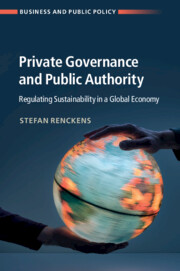Book contents
- Private Governance and Public Authority
- Business and Public Policy
- Private Governance and Public Authority
- Copyright page
- Contents
- Figures
- Tables
- Acknowledgments
- Abbreviations
- 1 Introduction
- 2 Explaining Public Interventions in Private Governance
- 3 Organic Agriculture
- 4 Biofuels
- 5 Fair Trade
- 6 Fisheries
- 7 Evaluating Public Interventions in Private Governance
- Appendix Interviews
- Endnotes
- References
- Index
3 - Organic Agriculture
Published online by Cambridge University Press: 02 April 2020
- Private Governance and Public Authority
- Business and Public Policy
- Private Governance and Public Authority
- Copyright page
- Contents
- Figures
- Tables
- Acknowledgments
- Abbreviations
- 1 Introduction
- 2 Explaining Public Interventions in Private Governance
- 3 Organic Agriculture
- 4 Biofuels
- 5 Fair Trade
- 6 Fisheries
- 7 Evaluating Public Interventions in Private Governance
- Appendix Interviews
- Endnotes
- References
- Index
Summary
The chapter explains how and why the EU has intervened with both standards and procedural regulations in the case of organic agriculture, first in 1991 and again in 2007. The chapter begins with analyzing the development of private organic agriculture governance since the late-1960s. It shows how attempts at private governance harmonization, the expectation of EU intervention providing new productive opportunities for farmers, and active lobbying by the organic agriculture movement (especially IFOAM) resulted in the 1991 EU Organic Agriculture Regulation. The Regulation offered an organic production standard and modest procedural rules for private governance schemes. Continued problems due to a fragmented private governance market led the Commission to propose severe limitations on private schemes’ governance space in the early-2000s. Opposition to these proposals by private governance schemes, the organic movement, and key Member States prevented significant public intervention. Nonetheless, both standards and procedural regulations were strengthened in an updated Regulation in 2007 by the introduction of a mandatory EU organic logo and mandatory accreditation of private auditors.
Keywords
- Type
- Chapter
- Information
- Private Governance and Public AuthorityRegulating Sustainability in a Global Economy, pp. 62 - 93Publisher: Cambridge University PressPrint publication year: 2020



